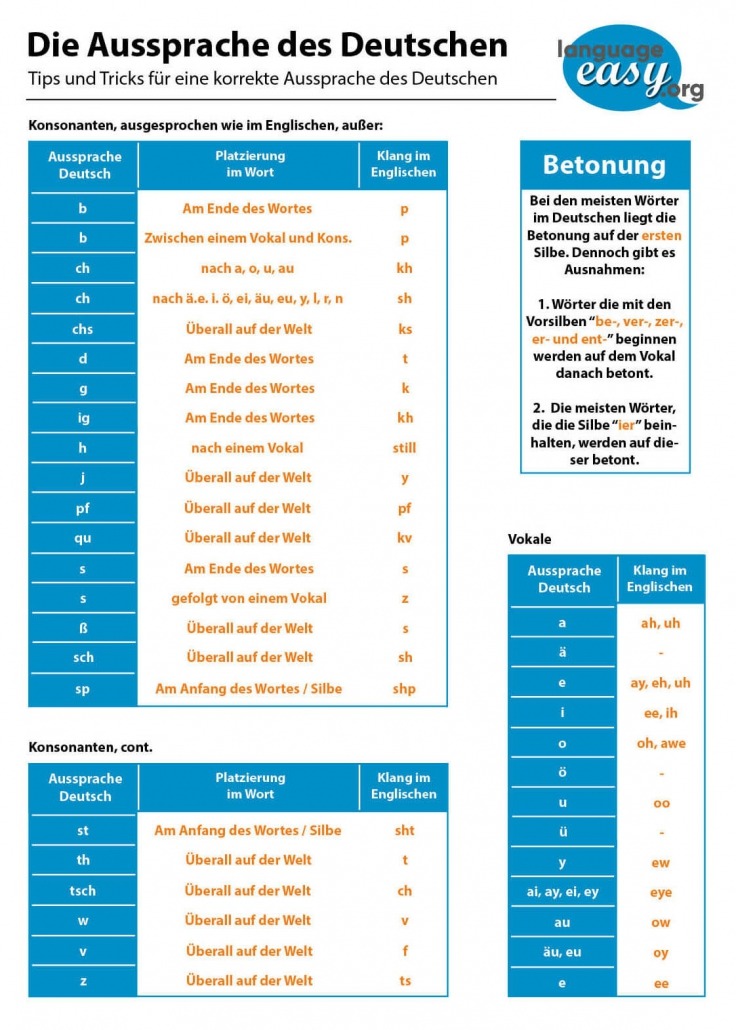German Pronunciation
German Pronunciation
Well, Let’s talk today of a rather ugly and complicated part of this language, the German pronunciation. Of course, “ugly” is relative – but nevertheless, the German pronunciation of some words differs a lot from the pronunciation of these words in other European languages.
Luckily, learning German pronunciation is nothing impossible – you just have to invest a lot of work and practice. But the result is definitely worth all the pain.
Simply keep in mind, when you suffer from the complicated German pronunciation, that it is one of the last steps for mastering German. After mastering 80% of German Grammar and learning so hard – does German pronunciation really frighten you?
Hopefully, this article will help you to understand the basic concepts of German pronunciation and give you some helpful tricks for mastering this topic. So, let’s try to trick some Germans! Maybe they will never find out that German is not your mother-tongue.
The German Accent
1. Pronunciation
So, what makes a German accent actually sound like a German accent? Of course, there are no anatomic differences between English and German speakers. Nevertheless, there are huge differences in intonation and word usage and even in the pronunciation of single letters of the alphabet. Well, let’s have a more detailed look on these topics.
2. Intonation
So, first of all, what is intonation? Luckily, that’s rather simple – it’s the melody and rhythm of a language. Of course, German intonation is a lot different to the English one: Where you rise you voice in English, maybe in German you lower it.
3. Word Usage
A third factor which makes you sound like a German is not about the pronunciation or intonation of German words or sentences. Actually, it is about the words you use to express yourself. Of course, that’s logical: The better you choose the words for expressing yourself, the more you seem German.
Another important aspect of word usage would be different slangs and German accents. Unfortunately, this topic is even more complicated than German pronunciation, as accents vary depending on the region. And I can tell you, there are a lot of German accents out there, and each one is completely different than the other one.

German Pronunciation
Tools for Learning German Pronunciation
Luckily, there are some tools and tricks that will make your learning experience with German pronunciation a lot easier. In the following, i’d like to present some of them – but just be creative! There are many more forms of getting some input of German culture in spoken form, the key-element of learning pronunciation.
Samples of German Language
First of all, and maybe most import, you need some samples of German language that demonstrate you how to pronounce German words. Well, I think that it’s not to difficult to find some German content. Simply look for German podcasts, listen to German radio, download some German audio book or watch German TV-Shows. Personally, I like the content you find on the website of the ARD Mediathek. Here you can find German news, but also classic shows on TV like “Tatort” (Movies about murders in different cities of Germany, which a lot of Germans watch every Sunday evening for almost 30 years).
By the way, there is also a free application of the ARD Mediathek available in different app-stores. Maybe you can download it on your smartphone. So, German will always be by your side.
So, try to listen or watch these shows or audios again and again. Unfortunately, that’s the only way you will hear all the details of German pronunciation.
Record Yourself
Well, maybe one of the most important advice I can give you for learning German pronunciation easier is recording yourself. Logically, it is the only way you can actually hear you pronunciation in a neutral way. As a consequence, you will be able to improve you pronunciation by comparing it to audio samples from native speakers. Simply use your smartphone or a computer program to record yourself.
Learn the International Phonetic Alphabet
Of course, all of you know the international phonetic alphabet. Well, do you? Don’t worry, it is quite simple. So, the IPA is a system of phonetic notations which is used all over the world. Actually, it is really useful as it provides you a way to express the pronunciation of every language of this world, independently from you origin. So called diacritic markers and letters are the tools used for that.
So, just have a look on the wikipedia article about the IPA especially for German and its different accents. Furthermore it covers accents from Austria and Switzerland.
Taking German Pronunciation to the Next Level
Once you have reached a point where you can easily express most things in German and you are looking for a new challenge, working on your accent and pronunciation is a great idea. By deconstructing what exactly makes and breaks pronunciation and strategically working on the different parts, you can greatly improve your spoken German.
The most important part is to isolate which areas can be improved and work on them in a targeted manner. For that, it is mandatory to construct a feedback system which allows you to incrementally improve the way you speak. Afterwards it is only a matter of time before you can pass as an actual German. For more information about German Grammar and other German related topics just have a look on language-easy.org!


Leave a Reply
Want to join the discussion?Feel free to contribute!